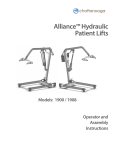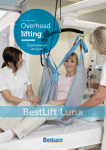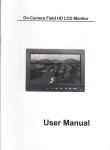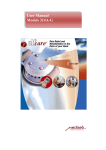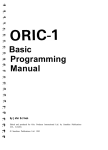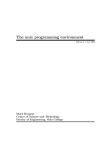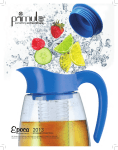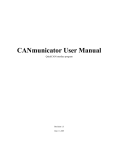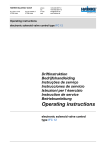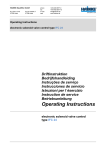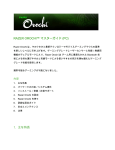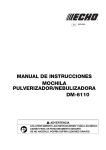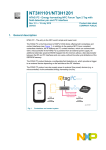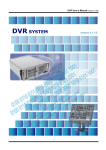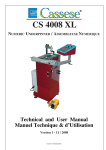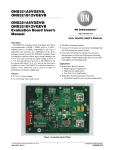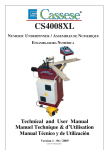Download Alliance™ Stand Assist Lifts
Transcript
Alliance™ Stand Assist Lifts !"#$%&'())*)#'+,-,')./0% !"#$%&' Legacy Series Performance Series !"#$%&%'##%() !"*!%&%+##%() !"#,%&%$##%() !"**-!"*.%&%'##%() !"*#-!"."%&%+##%() !"./-!".,%&%$##%() Operator Instructions Alliance Stand Assist Thank you for choosing Chattanooga Alliance Patient Lift! 01%)23324%52462%718-%9(2:52%42;14<%3=2%>1((1?@AB%@A>14C:3@1AD Dealer Name: ____________________________________ Telephone: ______________________________________ Serial #: _________________________________________ Date of Purchase: _________________________________ INSPECT YOUR MERCHANDISE Upon receipt of your Patient Lift, verify that all merchandise is complete and free from any shipping damage. Refuse delivery if the packaging appears to be badly damaged. If the merchandise is received damaged or is missing components, contact the shipping company immediately and file a claim. For further assistance, contact your local dealer or Product Support at the following: 1-800-494-3395 USA [email protected] DJO, Inc. 1430 Decision Street Vista, CA 92081 USA T: 1-800592-7329 USA DJOGlobal.com © 2013 DJO, LLC. All rights reserved. 2 Alliance Stand Assist SAFETY The Stand Assist sit-to-stand patient lift allows a caregiver to lift and transfer a patient safely with minimum physical effort. Before attempting to lift anyone, you should practice operating the lift and be able to explain to the patient the lifting and transfer procedures. Always keep the Operator’s Instructions Manual available with the lift. SAFETY INSTRUCTIONS • Special care must be taken with patients who are comatose, spastic, agitated, or otherwise severely handicapped. A competent caregiver must always be present during any patient lifting. • The sole function of the patient lift is for transferring a patient from one utility (beds, bathtubs, toilets, etc.) to another. • The lift should not be used to transport or move patients from room to room or over longer distances. Transfers should normally take place within the same patient room or bathroom. • Do not put anything (e.g. cushion, pad, etc.) between the user and the sling. This may cause user to slide out of the sling and cause injury. • The user/patient being transferred should be positioned in the center of the area being transferred from (i.e. bed, wheel chair, chair, commode, etc.) before being lifted, as well as when he/she is returned. • Keep lifter base widened (use foot pedals to accomplish this) and brakes unlocked during lifting. If the brakes are locked during the lift process, the lift may become unstable. • While the patient is suspended, always keep the patients centered between the base legs. • Do not attempt to roll the lift or casters over floor obstacles while the user is in the sling and on board. • Use only Chattanooga slings (manufactured by BestCare) specially designed and tested for Chattanooga patient lifts . Do not use slings manufactured by other companies on Chattanooga Stand Assist sit-to-stand patient lift. Chattanooga is not responsible for any consequence resulting from using non-Chattanooga products. • Use only Chattanooga or approved Chattanooga parts and components. Chattanooga is not responsible for any adverse consequence resulting from using parts and components from other manufacturers. • Service and repair of the patient lift should be performed by Chattanooga or its authorized dealers ONLY. Chattanooga is not responsible for any consequence resulting from any unauthorized service or repair. • Never attempt to lift over the maximum capacity of the lift and any accessories used in conjunction with the lift. The maximum safe working load for the lift will be clearly labeled on the lift. 3 Alliance Stand Assist DEFINITIONS AND SYMBOLS In this manual the user refers to the patient or resident and may be used interchangeably at different times. Caregiver refers to the operator or person who is assisting with the transfer. Symbols used in this manual and their meanings: Warning! Failure to heed this warning may result in damage to the product or serious injury to the operator and/or user. Important instructions follow. Read and understand the instructions in the manual before using the product. NOTE: Important information concerning the product and/or its correct and proper usage follows. 4 Alliance Stand Assist PRODUCT FEATURES DESCRIPTION & APPLICATIONS Chattanooga presents the Stand Assist Series of sit-to-stand patient lifts, a solution for patient transfers between bed, chair or commode. The lift reduces injury risk associated with antiquated manual patient lifting practices. Competitively priced and combined with a unique design, the lift provides a new level of comfort and safety. The Stand Assist lift has set the standard for value and is an option for residential use. • • • • • • • • 400, 500, 600 Lb. safe working loads Low base Fully adjustable knee pad Removable foot platform Four sizes of deluxe padded slings Optional buttock support strap Knee pad strap for extra leg support Features alternative Sani-sling hook-up that eliminates underarm transfer. 5 discomfort during Alliance Stand Assist SPECIFICATIONS AND OPTIONS Control Box Legacy-Series Performance-Series Input Voltage 220-240VAC 50Hz / 110120VAC 60Hz 220-240VAC 50Hz / 110-120VAC 60Hz Output Voltage 24 VDC 24 VDC Battery Pack 24 VDC 5AH 24 VDC 5AH Control Panel and Handset Panel and Handset Protection Class N/A IP66 Over-duty alarm by buzzer by LCD Battery Status by LED color indicator by LCD Specifications 400 Lb. 500 Lb. 600 Lb. 400 Lb. 68” 33” 26” 38” 500 Lb. 68” 33” 25.5” 38” 600 Lb. 68” 33” 25.5” 38” Base height clearance 4.5” 4.5” 4.5” Overall length Boom Internal Width 40” 19” 40” 19” 40” 19” Bariatric Size Kneepad Optional Optional Yes Bariatric Size Footrest Optional Optional Yes Buttock Support Strap Optional Optional Optional Kneepad/Calf Support Strap Optional Optional Optional Quick Release No Yes Yes Dual Front Casters No Yes No Maximum Safe Load Capacity Max. height of Boom Min. height of Boom Base closed external width Base open external width *Chattanooga is committed to continuous improvements of our products, therefore the specs, dimensions and features listed above are for guidance only and subject to change without prior notice. 6 Alliance Stand Assist ASSEMBLY Prior to assembly, unpack all parts from the shipping carton and check for any missing parts. Contact your dealer immediately if a part is missing. Parts List for PERFORMANCE-Series 1. 2. 3. 4. 5. 6. 7 8 9. 10 Base Mast Control Box Pendant Actuator Lifting Boom Kneepad Assembly Footrest Castor with Brake Front Castor Parts List for LEGACY-Series 1. 2. 3. 4. 5. 6. 7 8 9. 10 Base Mast Control Box Pendant Actuator Lifting Boom Kneepad Assembly Footrest Castor with Brake Front Castor 7 Alliance Stand Assist STEP BY STEP ASSEMBLY ()$*+, Engage the brakes. Remove the bolts from the bottom of the mast and base. Pull the Mast to an upright position. Re-insert the bolts into the holes at bottom of the mast and tighten the nuts. ()$*+- Attach boom to top of mast. Re-insert the bolts into the holes at bottom of the mast and tighten the nuts. 8 Alliance Stand Assist STEP BY STEP ASSEMBLY (CONT) ()$*+. A. Attach the bottom of Actuator to the bracket on the Mast and insert pin. Insert keeper ring through hole in pin to secure base of actuator. B. Attach the top of the Actuator to the bracket on the Boom and insert pin. Insert keeper ring through hole in pin to secure actuator to upper bracket. !" #" 9 Alliance Stand Assist STEP BY STEP ASSEMBLY (CONT) ()$*+/ KNEEPAD ASSEMBLY FOR PERFORMANCE-Series Insert slotted bolt through bracket with washer on the outside and loosely attach threaded knob to the mast by turning the knob two times. Slide “L” arm inside bracket with slotted bolt head inside the “L” arm then tighten to secure. Repeat these steps for the other side. Kneepad With both “L” arms securely attached to the mast, slide the kneepad onto the “L” arms and fasten into place with “U” bracket and knob bolt. “U” Bracket Knob Bolt Mast L-Shape Arms Threaded Knob Bracket 10 Alliance Stand Assist BATTERY INSTALLATION FOR PERFORMANCE-Series Install the control box. Slide the control box over and onto the flat metal hook mounted at the bottom of the Mast. Line up the control box with the hole at the top of the mast and insert the screw to hold the control box in place. Secure the control box by turning the lock mechanism into the lock position. CONTROL BOX Plug-Ins for Performance-Series LCD display / LCD Lifting actuator UP Lifting actuator DOWN AC Power Plug Battery pack release Battery indicator Actuator Plug Emergency button Pendant Plug 11 Alliance Stand Assist CONTROL BOX FEATURES: • • • • • • Smart charging function for longer battery life Battery capacity indicator on battery pack Soft start and stop for lifting actuator Soft and Hardware over-current protection Actuator’s Over-duty protection with sign on LCD Emergency stop button interrupts the power supply to the actuator and makes the actuator stop immediately in case of sudden danger • Internal charger • LCD-display showing battery capacity and indication when the battery needs recharging. • Audible alarm for low battery capacity • Standard protection class: IP 66 • Pulling-proof design to lock the AC plug LCD INDICATORS: Overload Capacity Function 90% Battery is charged to around 90% 70% Battery is charged to around 70 Battery Volume Overused 50% low battery Battery Low (Blink) 12 50% Battery Capacity Remaining Charge batteries immediately. 25% 25% Battery Capacity Remaining Charge batteries immediately. 10% Battery is charged to around 10% Buzzer beeps / Only lowering possible 0% Power off Alliance Stand Assist CONTROL BOX FEATURES (CONT) EMERGENCY STOP FOR PERFORMANCE ELECTRONICS ONLY Emergency stop button interrupts the power supply to the actuators and makes the actuators stop immediately in case of sudden danger. Press RED button Turn RED button clockwise EFGHIJ KLEFGHIJ *It is strongly recommended that the utton in pressed own when the lift will not be used for over 3 days to maintain optimal battery life and performance. FEATURES OF POWER PLUG: C-CLAMP : • when the battery is being charged, insert this C-clamp to secure the power plug WATERPROOF COVER: • when control is not being used, the cover should be closed to prevent water ingress. G&;(:C9 O:3249411>%;1624 REMOVE AND INSERT BATTERY PACK: REMOVE : press button A and pull out in the up direction (Fig.1) INSERT:% • put % the battery pack all the way down to position as shown in Fig.2 • slide into direction C while having the release button pressed (Fig.3) • make sure the battery pack won’t slide back off by pulling the battery pack without pressing the release button B. M@BN! M@BN. M@BN* 13 Alliance Stand Assist BATTERY ASSEMBLY FOR LEGACY - SERIES Attach the Control Box Hanging Bracket to the Mast and tighten the nuts. Once the bracket is secure, then place the Legacy Electronic Box inside. CONTROL BOX INSTRUCTIONS FOR LEGACY - SERIES Battery Indicator Battery Test Button Emergency Button 14 Alliance Stand Assist WORKING WITH THE BATTERY Charger Plug Pendant Plug Actuator Plug CHECKING THE BATTERY: • Check batteries by pressing the Battery Testing Button (blue circle with a battery sign) on the control box. • Batteries are fully charged when all lights on the Battery Indicator are “ON”. • Charge batteries when Indicator shown only one “GREEN” light. • Do not use the lift when no “GREEN” light is shown. Charge the batteries immediately. • Replace batteries when frequent charging is needed. CHARGING THE BATTERY • • • • • • • Ensure the power is switched “ON” (the red “RESET” button should be up). Insert charging plug into charging port on the control box. Plug charger to power supply. All lights of battery indicator should be “ON” while charging. It takes approximately 2-3 hours to fully charge the batteries from one green light. It takes approximately 7-9 hours to fully charge the batteries from the red light. Do not leave the batteries on charging for an extensive period of time. This will shorten the life of the batteries. • Do not let the batteries run down to the last red light. This might shorten the life of the batteries or damage the batteries. • Unplug the charger first before using the lift. 15 Alliance Stand Assist WORKING WITH THE BATTERY (CONT) KNOW WHAT YOUR BATTERY IS TELLING YOU !"#! !"#$%! !"##$! !"##$! !"##$! ! !"! !"! !"! !"! !"! !"##$%&'()*+,! !"! !"! !"! !"! !"#$!!!!! !""! !""! !""! !""! !""! !""#$%&'()"! !"#$%&'())&*(#+&,-.''*/01+'2!"#$%"#&'($! !""! !""! !""! !""! !"#$!"%%&'(&)$*'$!"#$+*,,&+%(*,! !""! ! WARNING BUZZERS The control box has a buzzer that provides you with information on the status of the batteries and the lift. To stop the buzzer, push down the RESET button or press the Battery Test button. !"##$%&'()$! !"#!$%&!'"! !"#$! !!!""#$%$"&! !"#$%&'(#))&$*&+'*,,&-*#)&./0! !!!""#$%$"&! !!!""#$%$"&! !!!""#$%"&"'(% !"#$%&'$(!)*&! !!!"#$%&''()! !"#$%&''()*! !"#$%&'(#")*+,-./)012! !"#$%&''()*! !"#$%&'()*%+,-! "#$%!&'(!)*++#$%! !"#$%&'()$#"*! !"#$!"%%&'(! !"#$%&'()$#"*! !"#$%&'(#()**+',,#$-#.*'$#*/0'$1#(*23,*%-4,* !"#$%&"'%()*'+! !"#$%&'(#))&$*&+'*,,&-*#)&./0! !"#$%&'(#))&$*&+'*,,&!"#$%&'(! !"#$%&"'(%))"*+",-! !"#$$%$%&'(")'*'&+,(%&#(-(#)./0! IMPORTANT NOTES ON CHARGING • Push lift to charging location and charge the batteries with the charger provided. Avoid unplug hand control and motor from control box. Frequent plug/unplug of the hand control and motor into/from the control box may damage the control box. • Do not charge batteries over 12 hours. Patient Lift will not operate while charging. 16 Alliance Stand Assist OPERATING INSTRUCTIONS Double check all assemblies for tightness and read operating instructions carefully prior to use. Do not attempt to use patient lift unless the patient exhibits control over the upper body, strength to grasp the handles, ability to bear some weight and flexibility in knees, hips and ankles. PREPARATION BEFORE LIFTING • Turn on the power by twisting the RED RESET BUTTON clockwise • Press the UP or DOWN button on the hand control once and check if the battery indicator lights are on. • Position the base of the lift around or under the object • Widen the base and engage the caster brakes Do not attempt to transfer a patient without prior approval of the person’s nurse. Also, do not transfer without having studied the instructions and performed several practices in operating the product. Together with the patient’s doctor, nurse or medical attendant, select a sling that is both practical and comfortable. The sling selected should be one that serves the needs of the patient, while providing the patient with optimal safety. Never interfere with the lift unless instructed by the attendant. Have a doctor, nurse, or medical attendant (experienced in the use of the Stand Assist Lift) present during the first few times the lift is used to transfer a new user. 17 Alliance Stand Assist FITTING STAND ASSIST SLING • • • • Position the patient in a sitting position Slide the sling down patient’s back to lumbar position. Draw the shoulder straps to the front of the patient close to the chest. Draw the waist belt around patient’s waist and press together to fasten. Attach the shoulder straps to the hooks. Shoulder strap loop Shoulder strap Velcro waist belt Sling Loop Options LONG LOOP LONG LOOP - reclined position CENTER LOOP - semi reclined SHORT LOOP - most upright CENTER LOOP SHORT LOOP OR FOR SLING APPLICATION • Place sling behind seated patient with the 2 red pads under the arms. • Cross the adjustable chest belt over and fasten it securely using the buckle (adjust for comfort). • Cross the short black strap over and pull the left loop strap through the black strap. • Hook the two loop straps to the hooks on the lift boom using the same hook and loop sequence on each side. • The black strap will be straight across in front of patient to stabilize the sling during lift. • Have patient grasp handles on boom and tilt head back slightly. • Make sure the patients feet are firmly on the platform and knees are touching the kneepads with kneecaps just above the padding. • Use the lift to complete the lift and pivot transfer. 18 Alliance Stand Assist FITTING SUPPORT STRAP DIAGRAM 1 P Q DIAGRAM 2 DIAGRAM 3 : ) • Check sling weight capacity for the patient being lifted. Do not exceed maximum safe working load. • Review following procedures carefully prior to attempting lift. Call with any questions. • Position the sling around the buttocks of the patient. This sling is designed to support the middle and lower part of the body. • Attach the sling strap to the lower “pig tail” “A” on the mast of the Stand Assist lift as in Diagram 1. Bringing the other side around the back of the patients’s buttocks (to fit like a park swing) and attach lower “pig tail” “B”. • Position sling so it gives the greatest support to middle and lower part of the patient being lifted. • Notice, in Diagram 2 and 3, that the Buttock strap MUST be used with the Stand Assist sling. These slings are designed to compliment one another in providing the greatest comfort and security for the patient being transferred. • Do not lock caster brakes to allow lift to properly balance weight. LIFTING HINTS • Prior to beginning a lift have the patient lean slightly back and look at the a 45 degree angle to the ceiling; this help position the sling; this is recommended only at the start of a lift • Try the sling straps in various color positions to establish best fit • Always insure the same color straps on each side are attached to lift • Should patients have a larger girth in mid section or back side area try the optional buttock strap to help with initial lift leverage • Remember this lift is designed for pivot transfers and it is not necessary to lift to full upright position; as long as the patients body clears bed or chair and vice versa you can It is not uncommon for the strap to loosen and drop down as lift proceeds. 19 Alliance Stand Assist LIFT AND TRANSFER FROM BED • • • • • • • • • • • • • • • • • Fit sling as described in “Fitting Stand Assist Sling”. Push lift towards patient. Open the base of the lift. Apply the brakes in both rear casters. Position patient’s feet on the foot platform and knees against the knee pad. Attached the sling straps to the hooks. Have the patient’s hands holding the handles. For patients who cannot hold the handles, have them hold their arms around the chest. Press the “UP” button on the hand control. Before the patient’s body has lifted from the bed, stop and make sure the sling is secured and patient’s knees are against the knee pad. The patient should be comfortable with the pressure under the arms. If not, adjust the sling and try another loop option to release pressure. Press the “UP” button until the patient’s body has completely left the bed. Transfer to another object can be done at this position without the patient attending a full standing position. Release the brakes, close the base, and pull the lift away from the bed. Lower the patient to the object intended. To lift patient in a standing position, continue to lift until the patient’s knees are locked in a standing position. At the standing position, patient’s knees may move away from the knee pad. Release the brakes, close the base, and pull the lift away from the bed. Lower the patient to the object intended. Reverse the above procedures when lowering the patient to the bed. 20 Alliance Stand Assist LIFT AND TRANSFER FROM SEATED POSITION • Fit sling as described in “Fitting Stand Assist Sling”. • Push lift towards patient. Open the base of the lift to go around the chair. Apply the brakes in both rear casters. • Position patient’s feet on the foot platform and knees against the knee pad. • Attached the sling straps to the hooks. • Have the patient’s hands holding the handles. For patients who cannot hold the handles, have them hold their arms around the chest. • Press the “UP” button on the hand control. • Before the patient’s body is lifted from the chair, stop and make sure the sling is secured and patient’s knees are against the knee pad. • The patient should be comfortable with the pressure under the arms. If not, adjust the sling and try another loop option to release pressure. • Press the “UP” button until the patient’s body has completely left the chair. • Transfer to another object can be done at this position without the patient attending a full standing position. • Release the brakes, close the base, and pull the lift away from the chair. • Lower the patient to the object intended. • To lift patient in a standing position, continue to lift until the patient’s knees are locked in a standing position. • At the standing position, patient’s knees may move away from the knee pad. • Release the brakes, close the base, and pull the lift away from the chair. • Lower the patient to the object intended. • Reverse the above procedures when lowering the patient to the chair. 21 Alliance Stand Assist LIFT AND TRANSFER USING SANI SLING SANI (TOILETING) SLING The Toileting Sling can be used with the Stand Assist to lift a patient in a sitting position. When in use the Stand Assist Toileting Sling supports the client under the thighs and across the mid-back area. R=18(<24%534:9%(119 R=18(<24%534:9 S2(;41%?:@53%)2(3 E2B%534:9 E2B%534:9%(119 The Sani (Toileting) Sling is not suitable for patients who have involuntary movements or patients with limited postural control. Fitting the Sani (Toileting) Sling • • • • • • • Slide the sling down patient’s back to lumbar position. Draw shoulder straps under the arms and around the chest into the front. Draw Velcro waist belt around waist and press together to fasten. Draw each leg support under the thigh. Crisscross leg straps by feeding one of the leg straps through the other strap. Attach shoulder straps to hooks in upper ends of the lifting arms. Attach leg straps to hooks in the lower ends of the lifting arm. 22 Alliance Stand Assist MAINTENANCE AND INSPECTION The operator of the lift shall inspect the Stand Assist Lift before each use. • • • • Check all bolts for tightness. Make sure the base can be easily widened and that all lift parts are in place. Make sure that casters can be turned freely, and that caster brakes can be engaged. Make certain all necessary items (i.e. slings, wheelchairs, etc.) are ready for use. At least once a month, the lift should be thoroughly inspected by a person qualified to recognize any signs of wear and tear and looseness of bolts or parts. Replace any worn parts immediately. To lubricate, put a drop of oil on the following points when the Stand Assist Lift is placed into service and every month thereafter: Top of Mast, Spreader Hinge, and Caster Axles. ITEM BOOM & SPREADER BAR Check connections between Boom and Mast for improper connection, looseness or wear. Check the Boom for bending and deflection. MAST Check the Mast for bending or deflection. BASE & FOOT PEDAL Check bolts and nuts for looseness.. Check casters and axle bolts for tightness. Check rubber parts on the casters for defletion FIRST RECEIVED MONTHLY X X EVERY 3 MONTHS X 23 X X X X X X X X Alliance Stand Assist MAINTENANCE AND INSPECTION (CONT) FIRST RECEIVED ITEM MONTHLY BASE & FOOT PEDAL Apply grease to caster ball bearings if needed. X Check welding joints for rust and crack. CLEANING AS NEEDED ACTUATOR & CONTROL BOX Make sure the control box is firmly affixed to the mast. Make sure the actuator is secured to the Boom and mast with pins and key rings Make sure actuator plug into control box is not loose. SLINGS & SLING HARDWARE Check sling for wear. Check sling hardware every time before use. 24 X X X X X X X X X X EVERY 3 MONTHS X X Alliance Stand Assist TROUBLESHOOTING GUIDE The following list of encountered problems and solutions will assist you in determining what may be causing your patient lift not to function as designed. If you have a problem occurring which is not listed below, please contact your dealer or technical support for help. Do not attempt to repair or replace components or parts on your lift as this may void your warranty or cause further problems that may result in patient injury. Stop using your lift immediately if it is not functioning correctly or any warning beeps are heard. I need to re-charge my batteries often or they fail to hold a charge when I charge them. • Replace the batteries or battery pack as they are at the end of their life cycle • Batteries should be changed every 18-24 months depending on usage The actuator will either go up or down but not both • Replace your hand control as it is at the end of its life cycle • Your control box may be malfunctioning There is a grinding sound inside the actuator when lifting • Replace your actuator as the internal gears are stripped The actuator stops and starts while lifting or lowering • Replace the batteries or battery pack as they are at the end of their life cycle My lift will not operate even though it shows the batteries are charged • Unplug the AC power cord from the control box as the lift will not work when the control box/charger is connected to AC Power • Check to make sure the hand control is properly inserted all the way into the control box port • Check to make sure the actuator plug is properly connected and inserted all the way into the control box • Your hand control needs to be replaced as it is at the end of its life cycle If there is a problem you cannot correct, please contact the dealer for assistance. 25 Alliance Stand Assist EMERGENCY LOWERING MECHANIM The following instructions apply to PERFORMANCE-series ONLY In case there is a failure with the actuator or electronics and the user is left suspended in mid-air, please follow the procedures below to safely lower the user to a safer position. The Quick Release mechanism is activated by the RED lever mounted at the top end of the actuator. Activate the Quick Release by pulling the RED lever with the arrow symbol in the direction indicated by the arrow. This will de-clutch the actuator and safely lower the user down. NOTE! When the Quick Release is activated, the boom will not lower itself unless there is sufficient weight or force applied in the downward direction. Contact your dealer immediately if standard troubleshooting techniques do not correct the failure. Do not attempt to lift until all failure and safety issues have been resolved. NOTE: The emergency lowering device is intended for use during lift failure. This device will allow lowering of patients only. Please contact your dealer immediately in case of failure. 26 Alliance Stand Assist WARRANTY ETUT0IJ%VWFJKG0%OPWWPL0XN%R8)Y2;3%31%3=2%324C5%)2(1?-%JZF-%EEG%[\G1C9:A7]^%9416@<25%3=2% >1((1?@AB%(@C@32<%941<8;3%?:44:A37%42(:3@AB%31%G=:33:A11B:%P((@:A;2%V:3@2A3%E@>35%[\V41<8;35]^N% _% _% _% _% _% _% _% _% E@>3%>4:C25%:A<%5942:<24%):4D%*%72:45 P;38:314D%.%72:45 V:435%@A;(8<@AB%;:53245-%;1A341(%)1`-%VGQ-%92A<:A3-%;=:4B24D%.%72:45 Q:3324@25D%!%72:4 O2@B=%R;:(2D%.%72:45 R3:A<%P@<%:((%;1C91A2A35D%.%72:45 a7<4:8(@;%98C95D%!%72:4 R(@AB5D%$%C1A3=5 0=2%:)162%?:44:A37%924@1<5%;1CC2A;2%1A%3=2%<:32%1>%3=2%14@B@A:(%;8531C24%984;=:52%1>%3=2%V41<8;3%>41C% G=:33:A11B:%14%:A%:83=14@b2<%G=:33:A11B:%<2:(24N%%TA%3=2%262A3%1>%:%<2>2;3%@A%C:324@:(%14%?14cC:A5=@9-% G1C9:A7%?@((%429:@4%14%429(:;2%3=2%<2>2;3@62%;1C91A2A3%14%3=2%V41<8;3-%:3%G1C9:A7d5%193@1A-%?@3=183% ;=:4B2%31%;8531C24-%:A<%G1C9:A7%5=:((%)2%42591A5@)(2%>14%5=@99@AB%2`92A525%>14%<2>2;3@62%V41<8;35%3=:3% :42%42384A2<%)7%3=2%;8531C24%:3%G1C9:A7d5%42e8253%:A<%>14%5=@99@AB%2`92A525%>14%429:@42<%14%429(:;2<% V41<8;35%3=:3%:42%5=@992<%31%3=2%;8531C24N%% 01%C:c2%:%?:44:A37%;(:@C-%G1C9:A7d5%G8531C24%G:42%J29:43C2A3%14%G1C9:A7d5%:83=14@b2<%<2:(24%?=@;=% 51(<%3=2%V41<8;3%C853%)2%A13@!%2<%1>%3=2%<2>2;3%<84@AB%3=2%:99(@;:)(2%?:44:A37%924@1<%:)162N%%V41<8;35% C:7%A13%)2%42384A2<%)7%;8531C24%?@3=183%:%42384A%:83=14@b:3@1A%A8C)24N%%V41<8;35%3=:3%:42%42384A2<%>14%:% ?:44:A37%429:@4%:42%379@;:((7%429:@42<%?@3=@A%*#%<:75%>41C%3=2%<:32%3=2%V41<8;3%@5%42;2@62<%)7%G1C9:A7-% G1C9:A7d5%<2:(24%14%G1C9:A7d5%;243@!%2<%5246@;2%;2A324N% 0=@5%?:44:A37%?@((%)2%61@<%@>%429:@45%14%V41<8;3%C1<@!%;:3@1A5%:42%C:<2%)7%:A71A2%13=24%3=:A%G1C9:A7-% G1C9:A7d5%<2:(24-%14%G1C9:A7d5%;243@!%2<%5246@;2%;2A324N% 0=@5%?:44:A37%<125%A13%;1624D%[!^%429(:;2C2A3%9:435%14%(:)14%>84A@5=2<%)7%:A71A2%13=24%3=:A%G1C9:A7-% G1C9:A7d5%<2:(24-%14%G1C9:A7d5%;243@!%2<%5246@;2%;2A324-%[.^%<2>2;35%14%<:C:B2%;:852<%)7%(:)14% >84A@5=2<%)7%:A71A2%13=24%3=:A%G1C9:A7-%G1C9:A7d5%<2:(24-%14%G1C9:A7d5%;243@!%2<%5246@;2%;2A324-%14%[*^% :A7%C:(>8A;3@1A%14%>:@(842%@A%:%V41<8;3%;:852<%)7%:)852-%:;;@<2A3%14%C@5852-%@A;(8<@AB%)83%A13%(@C@32<%31-% 3=2%>:@(842%31%9416@<2%42e8@42<%C:@A32A:A;2%14%:A7%852%3=:3%@5%@A;1A5@532A3%?@3=%3=2%V41<8;3%K524%U:A8:(N%% G1C9:A7%@5%A13%42591A5@)(2%>14%@AY847-%<2:3=%14%<:C:B2%4258(3@AB%>41C%V41<8;3%C1<@!%;:3@1A5%14%429:@45% 924>14C2<%)7%5246@;2%92451AA2(%?=@;=%=:62%A13%)22A%:83=14@b2<%)7%G1C9:A7N%%0=@5%?:44:A37%2`32A<5%31% 3=2%14@B@A:(%;8531C24%:A<%@5%A13%34:A5>24:)(2N%%0=@5%9:4:B4:9=%53:325%3=2%2A3@42%?:44:A37%42(:3@AB%31%3=2% V41<8;3-%:A<%G1C9:A7%<125%A13%:83=14@b2%:A7%92451A%14%4294252A3:3@62%31%C1<@>7%3=@5%?:44:A37N% GFUVPLX%aIWIQX%JTRGEPTUR%PLX%F0aIW%IfVWIRR%FW%TUVETIJ%OPWWPL0TIR%LF0%RI0% MFW0a%TL%0aI%MFWIgFTLg%ETUT0IJ%VWFJKG0%OPWWPL0X-%TLGEKJTLg-%QK0%LF0%ETUT0IJ% 0F%0aI%TUVETIJ%OPWWPL0TIR%FM%UIWGaPL0PQTET0X%FW%MT0LIRR%MFW%P%VPW0TGKEPW% VKWVFRIN%%GFUVPLX%OTEE%LF0%QI%ETPQEI%MFW%PLX%TLJTWIG0-%RVIGTPE-%TLGTJIL0PE-%FW% GFLRIhKIL0TPE%JPUPgIR%FW%EFR0%VWFMT0R-%GPKRIJ%QX%PLX%VWFJKG0%JIMIG0%OaI0aIW% GEPTUR%PWI%QPRIJ%KVFL%0FW0%[TLGEKJTLg%LIgETgILGI^-%OPWWPL0X-%GFL0WPG0%FW% F0aIWOTRI-%ISIL%TM%GFUVPLX%aPR%QIIL%PJSTRIJ%FM%RKGa%VF0IL0TPE%EFRR%FW%JPUPgIN% 0F%0aI%If0IL0%0aI%MFWIgFTLg%JTRGEPTUIWR%PWI%LF0%PEEFOIJ%QX%PVVETGPQEI%EPO-% PLX%TUVETIJ%OPWWPL0TIR%OTEE%QI%ETUT0IJ%0F%0aI%JKWP0TFL%FM%0aI%IfVWIRR%ETUT0IJ% OPWWPL0X%VIWTFJR%PVVETGPQEI%0F%0aI%VWFJKG0%R0P0IJ%PQFSIN%%RFUI%R0P0IR%JF%LF0% PEEFO%ETUT0P0TFLR%FL%aFO%EFLg%PL%TUVETIJ%OPWWPL0X%EPR0R-%FW%0aI%IfGEKRTFL%FW% ETUT0P0TFL%FM%TLGTJIL0PE%FW%GFLRIhKIL0TPE%JPUPgIR%RF%0aI%PQFSI%ETUT0P0TFLR%UPX% LF0%PVVEX%0F%GKR0FUIWN 27 Alliance Stand Assist JZF-%TA;N !'*#%J2;@5@1A%R34223 S@53:-%GP%".#/!%%%KRP 0D%!&/##&+".&,*."%%%KRP JZFg(1):(N;1C % % % % % i.#!*%JZF-%EEGN%%P((%4@B=35%4252462<N% % % % % % % % % 28 % % %%%%%%%%%%%%%%%%%%P((@:A;2%R3:A<%P55@53%U:A8:( % % %%%.//#*%W26%P%%%"j.#!*% %





























